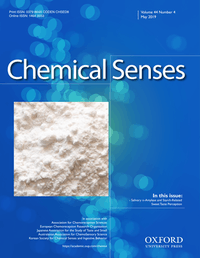Chemical Senses
Chemical Senses is a peer-reviewed scientific journal covering all aspects of chemoreception, including taste, smell, vomeronasal, and trigeminal chemoreception in humans and other animals. It is published by Oxford University Press and the editor-in-chief is Wolfgang Meyerhof (Saarland University). It is the official journal of the Association for Chemoreception Sciences,[1] the European Chemosensory Research Organization,[2] the Japanese Association for the Study of Taste and Smell, the Australasian Association for Chemosensory Science, and the Korean Society for Chemical Senses and Ingestive Behavior.
 | |
| Discipline | Neuroscience, psychophysics, Food Science |
|---|---|
| Language | English |
| Edited by | Wolfgang Meyerhof |
| Publication details | |
Former name(s) | Chemical Senses and Flavor |
| History | 1974-present |
| Publisher | |
| Frequency | 9/year |
| 2.336 (2018) | |
| Standard abbreviations | |
| ISO 4 | Chem. Senses |
| Indexing | |
| CODEN | CHSED8 |
| ISSN | 0379-864X (print) 1464-3553 (web) |
| LCCN | 80649025 |
| OCLC no. | 936518594 |
| Links | |
History
The journal was established in 1974 as Chemical Senses and Flavor, with Howard Moskowitz and Egon Peter Köster as founding editors.[3] Volumes 1 and 2 were published by D. Reidel Publishing Company. Beginning with volume 3 in 1978, Chemical Senses & Flavor was published by IRL Press in association with the European Chemosensory Research Organization. The journal title was changed to Chemical Senses in 1980. The publisher changed to Oxford University Press in 1989 (volume 14). An association with the Association for Chemoreception Sciences began in 1982 and with the Japanese Association for the Study of Taste and Smell in 1994.
Abstracting and indexing
The journal is abstracted and indexed in:
- Aquatic Sciences and Fisheries Abstracts[4]
- BIOSIS Previews[5]
- CAB Abstracts[6]
- Current Contents/Agriculture, Biology, and Environmental Sciences[5]
- Current Contents/Life Sciences[5]
- Embase[7]
- Food Science & Technology Abstracts[4]
- Index Medicus/MEDLINE/PubMed[8]
- PASCAL[4]
- ProQuest databases[4]
- PsycINFO [9]
- Science Citation Index[5]
- Scopus[10]
- The Zoological Record[5]
According to the Journal Citation Reports, the journal has a 2018 impact factor of 2.336.[11]
References
- "Resources: Chemical Senses". Homepage. Association for Chemoreception Sciences. Retrieved 2016-05-02.
- "Publications – European Chemoreception Research Organization". ecro.online. 1/2/20. Retrieved 1/2/20. Check date values in:
|access-date=, |date=(help) - Köster, E.P.; Moskowitz, H.R. (1 January 1974). "Editorial". Chemical Senses and Flavor. 1 (1): 3. doi:10.1093/chemse/1.1.3.
- "Chemical Senses". MIAR: Information Matrix for the Analysis of Journals. University of Barcelona. Retrieved 2019-05-02.
- "Master Journal List". Intellectual Property & Science. Clarivate Analytics. Retrieved 2019-05-02.
- "Serials cited". CAB Abstracts. CABI. Retrieved 2019-05-02.
- "Embase Coverage". Embase. Elsevier. Retrieved 2019-05-02.
- "Chemical Senses". NLM Catalog. National Center for Biotechnology Information. Retrieved 2019-05-02.
- "PsycINFO Journal Coverage". American Psychological Association. Retrieved 2019-05-02.
- "Source details: Chemical Senses". Scopus preview. Elsevier. Retrieved 2019-05-02.
- "Chemical Senses". 2018 Journal Citation Reports. Web of Science (Science ed.). Clarivate Analytics. 2019.